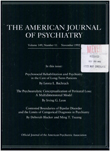The psychiatric patient's right to effective treatment: implications of Osheroff v. Chestnut Lodge
Abstract
Although Osheroff v. Chestnut Lodge never reached final court adjudication, the case generated widespread discussion in psychiatric, legal, and lay circles. The author served as a consultant to Dr. Osheroff and testified that Chestnut Lodge failed to follow through with appropriate biological treatment for its own diagnosis of depression, focusing instead on Dr. Osheroff's presumed personality disorder diagnosis and treating him with intensive long-term individual psychotherapy. The author suggests that this case involves the proposed right of the patient to effective treatment and that treatments whose efficacy has been demonstrated have priority over treatments whose efficacy has not been established.
Access content
To read the fulltext, please use one of the options below to sign in or purchase access.- Personal login
- Institutional Login
- Sign in via OpenAthens
- Register for access
-
Please login/register if you wish to pair your device and check access availability.
Not a subscriber?
PsychiatryOnline subscription options offer access to the DSM-5 library, books, journals, CME, and patient resources. This all-in-one virtual library provides psychiatrists and mental health professionals with key resources for diagnosis, treatment, research, and professional development.
Need more help? PsychiatryOnline Customer Service may be reached by emailing [email protected] or by calling 800-368-5777 (in the U.S.) or 703-907-7322 (outside the U.S.).



